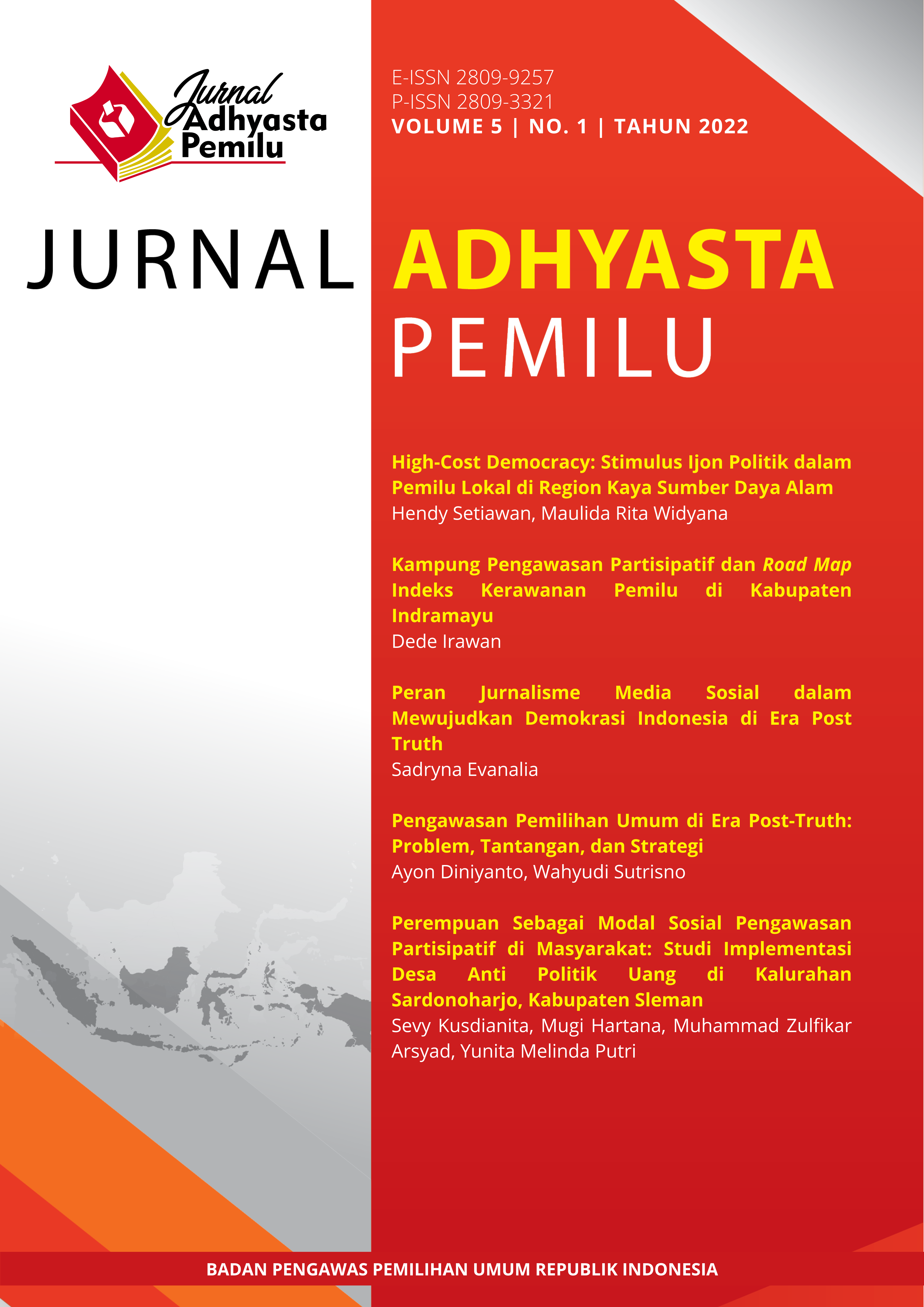Perempuan Sebagai Modal Sosial Pengawasan Partisipatif di Masyarakat
Studi Implementasi Desa Anti Politik Uang di Kalurahan Sardonoharjo, Kabupaten Sleman
DOI:
https://doi.org/10.55108/jap.v5i1.84Kata Kunci:
women, elections, social capital, participation supervision, anti-money politicsAbstrak
Participatory supervision is a surveillance movement that comes from the initiation of society on a voluntary basis. This movement involves all elements of society, including women. Women are also active in political participation, even having the potential to become the driving engine of grassroots movements. Currently, women have been active in the election process, become election participants, election organizers and are in the ranks of election supervision. This paper will discuss the role of women as the driving force of participatory supervision in the Anti-Money Politics Village program in Sardonoharjo Village, Sleman Regency, Yogyakarta Special Region through descriptive research methods and qualitative research types using social capital and participation approaches. The conclusion drawn from this study is that women are the social capital of the core movement in society and play a role in the formation of participatory movement patterns. The pattern of participatory movements carried out by women in the election process in the Village Anti-Money Politics program, has the potential to expand so that more massive participatory supervision is realized.
Unduhan
Referensi
Ardiansa, D. (2017). Menghadirkan Kepentingan Perempuan dalam Representasi Politik di Indonesia. Jurnal Politik, 2(1), 71–98. https://doi.org/10.7454/jp.v2i1.82
Aspinal, E., & Sukmajati, M. (2015). Politik Uang di Indonesia: Patronase dan Klientelisme pada Pemilu Legislatif 2014. Yogyakarta: Polgov.
Asshiddiqie, J. (2005). Hukum Tata Negara dan Pilar-Pilar Demokrasi. Jakarta: Konstitusi Pers.
Bawaslu. (2019). Indeks Kerawanan Pemilu 2019. Jakarta: Badan Pengawas Pemilihan Umum.
Bourdieu, P. (2015). The Logic of Practice. Society and Culture in South Asia, 1(1), 75–81. https://doi.org/10.1177/2393861714556427
Cahyono, B., & Adhiatma, A. (2022). Peran Modal Sosial Dalam Peningkatan Kesejahteraan Masyarakat Petani Tembakau Di Kabupaten Wonosobo. Conference In Business, Accounting, And Management (CBAM), 1(1), 131–144. Retrieved from http://jurnal.unissula.ac.id/index.php/cbam/article/view/128
Cohen, J. M., & Uphoff, N. T. (1980). Participation’s Place in Rural Development: Seeking Clarity Through Specificity. World Development, 8(3), 213–235. https://doi.org/10.1016/0305-750X(80)90011-X
Creswell, J. W., & Poth, C. N. (2017). Qualitative Inquiry and Research Design: Choosing Among Five Approaches. New York: SAGE Publications, Inc.
Fukuyama, F. (1995). Trust: The Social Virtues and The Creation of Prosperity. New York: The Free Press.
Goss, K. A., & Heaney, M. T. (2010). Organizing Women as Women: Hybridity and Grassroots Collective Action in the 21st Century. Perspectives on Politics, 8(1), 27–52. https://doi.org/DOI: 10.1017/S1537592709992659
Habibi, M., & Nurmandi, A. (2021). Electoral Manipulations and Fraud Political Contestation: The Case of Regional Head Election. Politik Indonesia: Indonesian Political Science Review, 6(3). Retrieved from https://journal.unnes.ac.id/nju/index.php/jpi/article/view/23447
Hansford, T. G., & Gomez, B. T. (2010). Estimating the Electoral Effects of Voter Turnout. American Political Science Review, 104(2), 268–288. https://doi.org/10.1017/S0003055410000109
Häuberer, J. (2010). Social Capital Theory: Towards a Methodological Foundation. Wiesbaden: Verlag für Sozialwissenschaften.
Idris, N. (2010). Perempuan Minangkabau dalam Politik. Humaniora, 22(2), 164–175. https://doi.org/10.22146/jh.993
Khalyubi, W., & Perdana, A. (2021). Electoral Manipulation Informationally on Hoax Production in 2019 Presidential and Vice Presidential Election in Indonesia. Journal of Government and Political Issues, 1(2), 87–99. https://doi.org/10.53341/jgpi.v1i2.17
Kusnardi, M., & Harmaily, I. (1981). Pengantar Hukum Tata Negara Indonesia (4th ed.). Jakarta: Pusat Studi Tata Negara, Fakultas Hukum Universitas Indonesia.
Miles, M. B., Huberman, A. M., & Saldaña, J. (2014). Qualitative Data Analysis (Edition 3). Los Angles: Arizona State University.
Miller, A. H., Gurin, P., Gurin, G., & Malanchuk, O. (1981). Group Consciousness and Political Participation. American Journal of Political Science, 25(3), 494. https://doi.org/10.2307/2110816
Murdie, A., & Peksen, D. (2015). Women and Contentious Politics: A Global Event-Data Approach to Understanding Women’s Protest. Political Research Quarterly, 68(1), 180–192. https://doi.org/10.1177/1065912914563547
Prastyawan, A., Lestari, Y., Mardliah, S., Aisyiah, P., & Dewi, R. (2022). Women’s Participation in Election in Jombang District. JKMP (Jurnal Kebijakan Dan Manajemen Publik), 10(1), 8–15. https://doi.org/10.21070/jkmp.v10i1.1682
Putnam, R. D. (1994). Project Report Social Capital and Public Affairs. Buletin of the American Academy of Arts and Science, 47(8), 5–19. https://doi.org/10.2307/3824796
Rangkuty, R. P. (2018). Modal Sosial dan Pemberdayaan Perempuan (Kajian Modal Sosial dalam Pemberdayaan Perempuan Melalui Kegiatan PNPM Mandiri Pedesaan) (1st ed.). Lhokseumawe: Unimal Press.
Ray, R., & Korteweg, A. C. (1999). Women’s Movements in the Third World: Identity, Mobilization, and Autonomy. Annual Review of Sociology, 25(May), 47–71. https://doi.org/10.1146/annurev.soc.25.1.47
Sarwono, B. (2019). Cegah Awasi Tindak: Mengawal Pemilu 2019 di Daerah Istimewa Yogyakarta. Yogyakarta: Bawaslu D.I.Yogyakarta.
Sumaryadi, I. N., Sikumbang, R., & Indraatmaja, A. B. (2010). Sosiologi Pemerintahan: Dari Perspektif, Pemberdayaan, Interaksi, dan Sistem Kepemimpinan Pemerintahan. Bogor: Ghalia Indonesia.
Teele, D. L. (2020). Women & the Vote. Daedalus, 149(1), 25–39. Retrieved from https://www.jstor.org/stable/48563030
Undang-Undang Republik Indonesia Nomor 6 Tahun 2014 Tentang Desa. , (2014).
Valadbigi, A., & Harutyunyan, B. (2012). Studying the Peculiarities of Social Capital Among the Yezidi Rural Population of Armenia: Focusing on the Alterations of Social Trust. SCS Journal, 1(2), 113–130. Retrieved from https://dialnet.unirioja.es/servlet/articulo?codigo=4032822
Unduhan
Diterbitkan
Cara Mengutip
Terbitan
Bagian
Lisensi
Hak Cipta (c) 2022 Sevy Kusdianita, Mugi Hartana, Muhammad Zulfikar Arsyad, Yunita Melinda Putri

Artikel ini berlisensi Creative Commons Attribution 4.0 International License.



